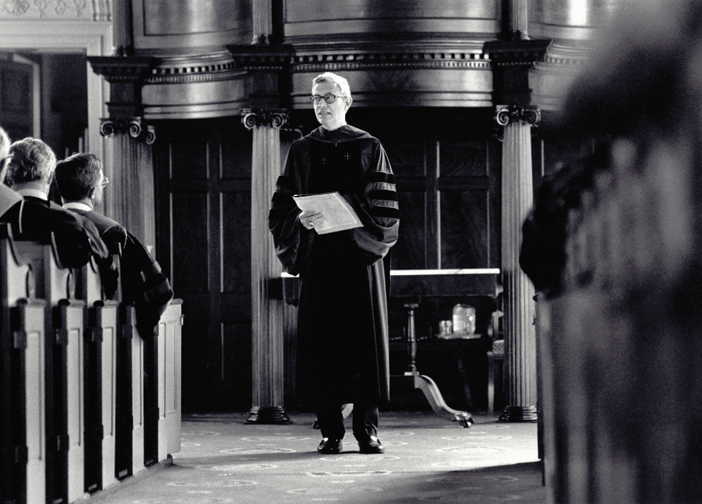We say farewell to the Medical School’s founding dean.
On a frigid January day, the Brown community woke to nearly two feet of snow and the news that the founding dean of its Medical School, Stanley M. Aronson, MD, MPH, had died, at the age of 92. Aronson was born, educated, trained as a physician, and employed as a doctor and professor in New York City, but in 1969 he and his wife, Betty, decided to raise their children outside the city and he accepted a job as chief of pathology at Brown and The Miriam Hospital.
Aronson’s decision was contingent upon the University pursuing plans to establish a medical school. He worked tirelessly with then-Provost Merton Stoltz and others to achieve that goal, advocating for the idea within Brown and around the state to build support. The School launched in 1972 with modest means—43 faculty members, 16 students, and little research infrastructure—but during his years as dean, 1973 to 1981, Aronson guided it through its crucial first accreditation and blazed the trail of its growth.
“We had a group of graduate students at Brown,” Aronson recalled in an interview last year. “We asked them, ‘Your records are excellent, you could probably get into Harvard or Boston University immediately. Would you gamble on a school that does not even have a building, has a faculty so small in number that we could fit the entire faculty in one classroom? We don’t have permission from the federal government to go ahead. Are you willing to gamble?’”
Sixteen students did gamble, and Aronson credited them for their courage. During his tenure, he created one of the nation’s first departments of family medicine, in 1978. He also inaugurated the Early Identification Program, a special route of ad mission for college students from Rhode Island as well as from
Tougaloo College (see Brown Medicine, Winter 2015).
Aronson intended for Brown’s medical school to be different from others; unlike the mid-century model that espoused detachment and aloofness, Brown’s would emphasize modesty and compassion. In a recent interview he recalled telling state legislators, “I tried to explain that we’re going to train men and women to be individual physicians, to learn both responsibility and humility, and a long-term commitment in a profession that is intensely imperfect.”
After stepping down from the deanship, Aronson served as editor of Medicine & Health Rhode Island, he penned a weekly column for the Providence Journal, and remained active at the Medical School, meeting and advising students. He was an advocate for palliative medicine, having helped to found Home & Hospice Care of Rhode Island in the 1970s.
Aronson is survived by his wife, Gale; his daughter, Sarah ’83 MD’87; his stepdaughter, Susan Symons; five grandchildren; and six great-grandchildren.
The following are some of the remembrances shared by alumni, faculty, and friends.




